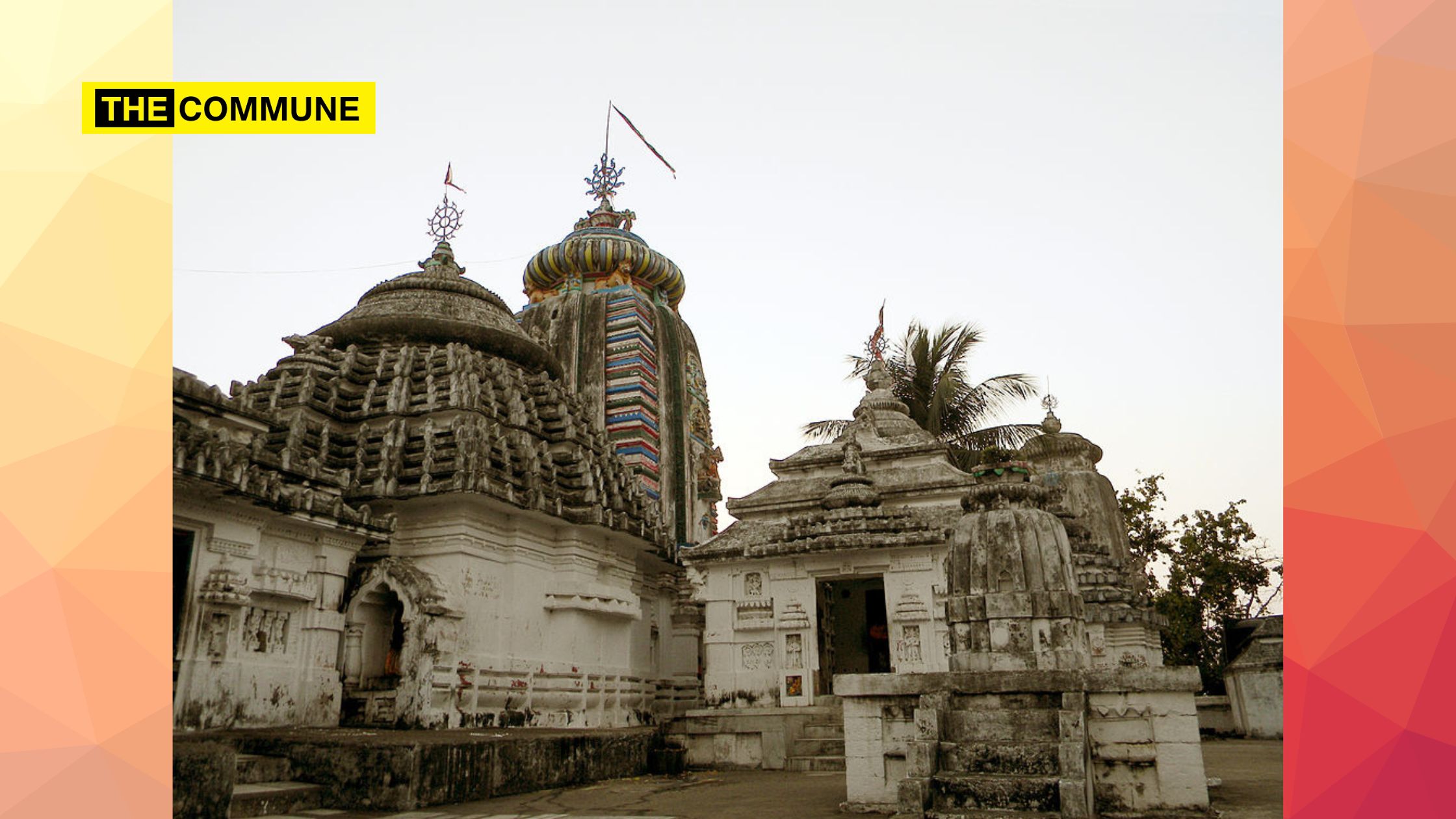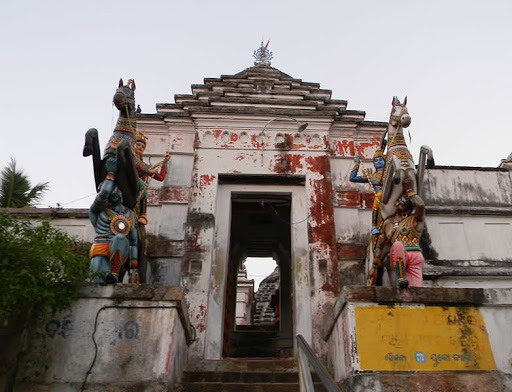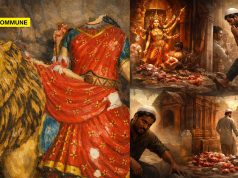
Image Source: Wikipedia
The origin of Shri Jagannath & especially his unique iconography is shrouded in mystery. Three ancient texts – Skanda Puran, Bamdeva Samhita, Markendya Puran & Niladri Mahodaya are considered to be the most important ancient texts for the study of Shri Jagannath. However, only a few are aware of Shri Jagannath’s connection back to Lord Neelmadhav & Sri Krishna’s demise towards the end of Dwapar Yug.
Exactly 36 years after the Kurukshetra War somewhere between 3100 BC- 3300BC, both Yudhistir & Sri Krishna saw the cosmic movements & planetary position changes coupled with a Comet explosion in the Sky which was an indicator to them of the imminent destruction that was coming up. While for Samrat Yudhistir he saw signs of Kali Yug stepping in, Sri Krishna remembered the curse of Gandhari & the ensuing annihilation of the Yadava’s that was foretold.
Yudhistir dispatched the Master Archer Arjun towards Dwarka & Sri Krishna went to a solitary place near Prabhas. As fate would have it Sri Krishna had left his mortal body before Arjun could have reached. While Arjuna had received the last orders of Keshav that he should escort the civilians of Dwarka out of the Walled City inside the Sea to a safe place & burn his body near Prabhas (Ban Ganga), to his utter dismay Arjuna couldn’t cremate the naval portion of Sri Krishna, which floated across the Sea as per the divine instructions towards the east coast. Here it was the tribal king Sabar Raj Bishwabasu (First birth – Bali, second Birth Jara the hunter & now the tribal chief) who located this Bramha Bastu (Sri Krishna’s Navel) & placed it in a Tiger Cave atop a dense jungle.
This is the present-day Kantilo. This Bramha Bastu assumed the shape of Shri Neel Madhava which was then worshipped by the Gods & Sabar King from then onwards. Madhav popular as the reincarnation of Sri Hari Vishnu has been worshipped since ancient times in the four regions of Odisha (Uddro Desh – Skand Puran) namely,
- Prachi Valley
- Mahanadi Valley
- Baitarani Valley and
- Rushikulya Valley
The worship of Madhava was immensely popular in the Mahanadi Valley & also patronized by the Kings of those regions. The fabrication of the Nilamadhav Temples in the Mahanadi Valley was manifested in the most important Nayagarh District & Kantilo as a town.
The beauty of Kantilo is absolutely fascinating one that of a Tapobhumi with abundant presence of hills, greenery & the breathtaking Mahanadi with its vast stretch.
The Neelmadhav Temple is located on the hilltop by the name of Bramhadri Parvat where Lord Bramha had prayed to Lord Nilamadhav for his resurrection & offered his Yagna. Major findings indicate that Kantilo was the abode of the primeval Lord Nilamadhava where Vaishanavism & Shaivisim both grew up together. This is further corroborated by the presence of a Kashi Vishwanath replica inside the Nilamadhava Temple.
It is widely & strongly believed that the Tiger Cave where Tribal King Sabaraj Bishwabasu worshipped the four-armed Lord Nilamadhav is located here at the Bramhadri hilltop overlooking the beautiful Mahanadi that touches its feet. Evidence & artifacts found indicate the emergence of Madhav Worship in Kantilo & adjoining areas of Mahanadi Valley from the 4th Century AD to the 14th Century AD.
Of all ancient places, Kantilo was popularly designated as Padmakhestra & Darubramha Khestra. Because the term Nilamadhava has the assimilation of three deities & can be broken up into Nila+ Ma+ Dhava which means Nila = Lord Jagannath (The creator of the Blue (Nila) earth & Sky, Ma = Subhadhra & Dhava = The white dress holder Lord Balabhadra.
The most important festival of Sri Neelmadhav is on Kartik Purnima when he is accorded the Sunabesh or the Golden Attire, also known as the Raj Rajeshwar Besh. Interestingly, the residents of Kantilo town & the adjoining villages are the descendants of either the Vidyapatis clan of Brahmins (one who discovered Sri Nilamadhav) or of the tribal lord Sabaraj Bishwabasu. This is evident from their way of living in the villages & the customs they follow.
One must remember to take a bath in the Mahanadi before visiting Sri Nilamadhava Temple as it is said in the Skanda Puran & Markendya Puran that Uddro desh has two major holy water bodies, the Mahanadi & the Mahadodhi ( Sea in Puri). One of the versions as detailed by the Shaunak Munigan, popularly known as the Shaunakadi shows the 4 super knowledgeable adolescent sons & yogis of Bramha – Sanat, Sanatan, Sananadan & Sanatkumar details that Vidyapati while carrying back the deity of Lord Nilamadhav went against the instruction of the primeval lord of not resting, for wherever Vidyapati would rest the deity will get fixed in that place /area, & that is how Nilamadhav got established in Kantilo as this is the place where Vidyapati had kept the deity down to answer to nature’s call.

While there are multiple folklore & legends associated with Nilamadhava’s existence in Kantilo (90kms from Bhubneshwar), the ancient & mythical environment existent over there is a clear indicator of the fact that this place is Older than times & civilizations. The hills display a striking resemblance to the descriptions mentioned in the Skanda Puran with a light blue radiant color emanating from them. As Skanda Puran states of the Neel Parvat (Blue Mountains), you only know that there you are. Kantilo is one of the 108 main Vaishnava sites associated with Vaishanivism & is a must-visit for all Lord Jagannath devotees. For here is the true birthplace of the Supreme Purush … Purushottam.
Published from Surya Sarathi Roy’s blog with permission.
Surya Sarathi Roy is a Heritage Conservationist and Indic History researcher who balances his IT career with work in historical preservation, affiliated with organizations like INTACH, ICOMOS, and IHAR.
Subscribe to our channels on Telegram, WhatsApp, and Instagram and get the best stories of the day delivered to you personally.




